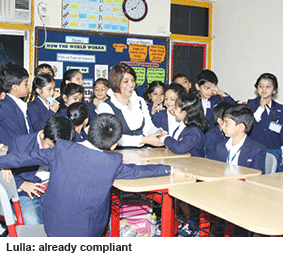 THE BJP-SHIV SENA government of Maharashtra (pop.112 million), which swept to power with a huge majority in the state’s legislative assembly election of October 2014, is set to make Marathi a compulsory subject for primary (class I-VII) children in all schools, no exceptions. Hitherto primary-secondaries affiliated with the pan-India Delhi-based Council for the Indian School Certificate Examinations (CISCE), Central Board of Secondary Education (CBSE) and schools affiliated with offshore examination boards including Cambridge International Examinations, UK (CIE) and the International Baccalaureate Organisation, Geneva (IBO) and several American boards had the choice to teach any second language including French and German. Moreover, the BJP-Sena government wants all examination boards to include an approved biography of Maharashtra’s iconic 16th century warrior king Chhatrapati Shivaji Maharaj in their history syllabus.
THE BJP-SHIV SENA government of Maharashtra (pop.112 million), which swept to power with a huge majority in the state’s legislative assembly election of October 2014, is set to make Marathi a compulsory subject for primary (class I-VII) children in all schools, no exceptions. Hitherto primary-secondaries affiliated with the pan-India Delhi-based Council for the Indian School Certificate Examinations (CISCE), Central Board of Secondary Education (CBSE) and schools affiliated with offshore examination boards including Cambridge International Examinations, UK (CIE) and the International Baccalaureate Organisation, Geneva (IBO) and several American boards had the choice to teach any second language including French and German. Moreover, the BJP-Sena government wants all examination boards to include an approved biography of Maharashtra’s iconic 16th century warrior king Chhatrapati Shivaji Maharaj in their history syllabus.
According to state education minister Vinod Tawde, the textbooks prescribed by the CISCE, CBSE, CIE and IB exam boards offer “just a few lines on Shivaji Maharaj’s life” which is a great deficiency in children’s education. In a veiled threat to the managements of private schools affiliated with pan-India and offshore exam boards, the minister said the mandatory NOC (no objection certificate) that the state’s education ministry has to issue every two years, will be denied to non-compliant schools.
However, educationists in the state say the minister doesn’t need to flex his muscles. Most institutions have already introduced Marathi into their school curriculums following an August 2009 government order (GO) to all schools to teach Marathi as a second language till class VIII. However following a writ petition filed by the Mumbai-based Unaided Schools Forum, the Bombay high court stayed the GO in 2011.
Nevertheless, most schools affiliated with pan-India and international boards already teach Marathi as a third language till class VII. “Though CIE and IBO boards follow international curriculums, learning the host country’s language is encouraged and we already teach Marathi in our school,” says Dr. Vandana Lulla, principal of the CIE, IBO and CISCE-affiliated Podar International School.
However, while most school principals and teachers accept that their students need to be familiarised with the language and culture of host states, they resent the imposition of ad hoc electorally-motivated regulations upon education institutions.
“Amendments and additions to syllabuses and curriculums need to be made at the start of the academic year, and after thorough discussion and debate because school managements need to prescribe the best textbooks, recruit language teachers and conduct assessments. The government needs to understand the logistical and administrative problems such ad hoc announcements create for school managements,” says Jasmine Madhani, principal of the IBO-affiliated Jamnabai Narsee International School.
Opposition parties are much less diplomatic and are well aware that the burst of nationalism and sub-nationalism that the BJP and other right-wing political parties are experiencing in Maharashtra and elsewhere, is driven by political populism. “Children in CBSE, CISCE and foreign board schools are mainly from households with parents in the all-India services, defence and the corporate world, and likely to be transferred every few years. What benefit will their children derive from learning Marathi? The choice of what to learn should be left to parents and students, not to politicians with an eye on the next election,” says Rajesh Tope, NCP leader, who was the higher and technical education minister in the state’s previous Congress-NCP government.
Tope believes the BJP-NCP government’s insistence on including Chhatrapati Shivaji Maharaj in the history syllabus of all schools is less driven by love of Shivaji than by lust for winning the Mumbai municipal corporation election due next year. “For some time now, each of the saffron alliance partners has been trying to grab ownership of Shivaji Maharaj in the belief that it will win them votes. But the electorate has matured, especially in Mumbai. All this posturing will win them brownie points, but not votes,” he says.
While the prospect of electoral dividends is undoubtedly driving the sub-nationalism of Maharashtra’s saffron government, it’s unlikely to be the sole consideration. The prospect of profiting from commissioning and printing approved Marathi language learning and history textbooks for the state’s 96,179 primaries can’t be far behind.
Dipta Joshi (Mumbai)



























